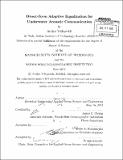| dc.contributor.advisor | James C. Preisig. | en_US |
| dc.contributor.author | Yellepeddi, Atulya | en_US |
| dc.contributor.other | Woods Hole Oceanographic Institution. | en_US |
| dc.date.accessioned | 2012-12-13T18:47:14Z | |
| dc.date.available | 2012-12-13T18:47:14Z | |
| dc.date.copyright | 2012 | en_US |
| dc.date.issued | 2012 | en_US |
| dc.identifier.uri | http://hdl.handle.net/1912/5281 | en_US |
| dc.identifier.uri | http://hdl.handle.net/1721.1/75626 | |
| dc.description | Thesis (S.M.)--Joint Program in Applied Ocean Science and Engineering (Massachusetts Institute of Technology, Dept. of Electrical Engineering and Computer Science; and the Woods Hole Oceanographic Institution), 2012. | en_US |
| dc.description | Cataloged from PDF version of thesis. | en_US |
| dc.description | Includes bibliographical references (p. 139-143). | en_US |
| dc.description.abstract | Adaptive equalization is an important aspect of communication systems in various environments. It is particularly important in underwater acoustic communication systems, as the channel has a long delay spread and is subject to the effects of time- varying multipath fading and Doppler spreading. The design of the adaptation algorithm has a profound influence on the performance of the system. In this thesis, we explore this aspect of the system. The emphasis of the work presented is on applying concepts from inference and decision theory and information theory to provide an approach to deriving and analyzing adaptation algorithms. Limited work has been done so far on rigorously devising adaptation algorithms to suit a particular situation, and the aim of this thesis is to concretize such efforts and possibly to provide a mathematical basis for expanding it to other applications. We derive an algorithm for the adaptation of the coefficients of an equalizer when the receiver has limited or no information about the transmitted symbols, which we term the Soft-Decision Directed Recursive Least Squares algorithm. We will demonstrate connections between the Expectation-Maximization (EM) algorithm and the Recursive Least Squares algorithm, and show how to derive a computationally efficient, purely recursive algorithm from the optimal EM algorithm. Then, we use our understanding of Markov processes to analyze the performance of the RLS algorithm in hard-decision directed mode, as well as of the Soft-Decision Directed RLS algorithm. We demonstrate scenarios in which the adaptation procedures fail catastrophically, and discuss why this happens. The lessons from the analysis guide us on the choice of models for the adaptation procedure. We then demonstrate how to use the algorithm derived in a practical system for underwater communication using turbo equalization. As the algorithm naturally incorporates soft information into the adaptation process, it becomes easy to fit it into a turbo equalization framework. We thus provide an instance of how to use the information of a turbo equalizer in an adaptation procedure, which has not been very well explored in the past. Experimental data is used to prove the value of the algorithm in a practical context. | en_US |
| dc.description.statementofresponsibility | by Atulya Yellepeddi. | en_US |
| dc.format.extent | 143 p. | en_US |
| dc.language.iso | eng | en_US |
| dc.publisher | Massachusetts Institute of Technology | en_US |
| dc.rights | M.I.T. theses are protected by
copyright. They may be viewed from this source for any purpose, but
reproduction or distribution in any format is prohibited without written
permission. See provided URL for inquiries about permission. | en_US |
| dc.rights.uri | http://hdl.handle.net/1912/5281 | en_US |
| dc.rights.uri | http://dspace.mit.edu/handle/1721.1/7582 | en_US |
| dc.subject | Joint Program in Applied Ocean Science and Engineering. | en_US |
| dc.subject | Electrical Engineering and Computer Science. | en_US |
| dc.subject | Woods Hole Oceanographic Institution. | en_US |
| dc.subject.lcsh | Underwater acoustics | en_US |
| dc.subject.lcsh | Mathematical models | en_US |
| dc.title | Direct-form adaptive equalization for underwater acoustic communication | en_US |
| dc.type | Thesis | en_US |
| dc.description.degree | S.M. | en_US |
| dc.contributor.department | Joint Program in Applied Ocean Physics and Engineering | en_US |
| dc.contributor.department | Woods Hole Oceanographic Institution | en_US |
| dc.contributor.department | Massachusetts Institute of Technology. Department of Electrical Engineering and Computer Science | |
| dc.identifier.oclc | 803605328 | en_US |
